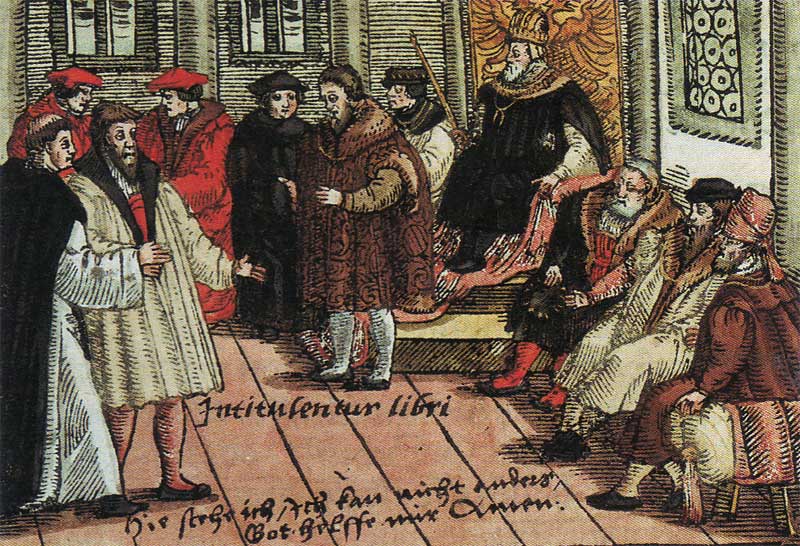Imperial Reforms at the Diet of Worms
Charles V and the Diet of Worms: Part 5 Guest post by Clayton Miles Lehman
Problems an empire wide
As Charles V came to the Diet of Worms to deal with proposed imperial reforms that would diminish his power, one stiff-necked monk was the least of his worries. This special guest series by Clayton Miles Lehman continues with part 5 below.

Luther in Worms, Colorized Woodcut | Wikipedia
The problem of the heretic Luther, dynastic considerations, and the negotiations with the English, French, and the Swiss had consumed all morning of Friday, 19 April 1521. Now Charles could turn to the central problem of the diet: reform of the imperial government. Thursday afternoon the estates had presented him a completely unacceptable proposal—dealing with them had kept Luther waiting outside the hall for two hours. Now Charles worked with his counselors to draft an appropriate response to the estates. Of course, when he accepted his election as emperor, Charles had agreed to a formal electoral concession (3 July 1519) in which he pledged to reconstitute a permanent imperial government in which the estates would share. This Reichsregiment or simply Regiment Emperor Maximilian had first established in 1500 in response to the estates’ demands at the previous Diet of Worms in 1496, but he had disbanded it a few years later. The estates also wanted the reinstitution of the Imperial Court of Justice (the Reichskammergericht) that Maximilian created in 1495. It went into suspension at his death in 1519, leaving the supreme dispensation of justice in the emperor’s court (the Aulic court or Hofgericht) alone. Now the estates wanted to recreate the Regiment in a form even more disadvantageous to the emperor’s interests. The estates did not merely aim to provide for continuity of government in the periods of the emperor’s absence—and given Charles’s role as King of Spain as well as emperor, everyone expected him to spend a great deal of time away from Germany—they actually wanted to create a permanent governmental institution aside from the imperial court that would manage the affairs of the empire even during the emperor’s presence. The issue of Regiment and Kammergericht constituted the principal item on the agenda of this first diet following the election, and Charles put it front and center when he opened the diet on 28 January, associating it with the general goal of restoring order and security in Germany. A month went by before the estates submitted a proposal, but Charles’s advisors received advance notice of its content, and he instructed the estates in veiled terms not to diminish the honor of emperor or empire by presuming to create a government operative in his presence. In early March a series of draft versions went back and forth between estates and emperor, and finally on 18 April the estates showed themselves just as stiff-necked as that crazy monk waiting outside the chamber to tell everyone that he alone knew the truth. They had the nerve to ask that Charles accept their proposal without any of the changes the imperial advisors had worked on, and on top of that to finance it. So before the next day, Friday 19 April, ended, Charles had his advisors prepare his answer and return it to the estates:
Emperor Maximilian considered [Regiment and Kammergericht] neither honorable, praiseworthy, nor useful, but rather diminishing of His Majesty and the Holy Empire in many respects; therefore he never wished to realize it. And since now His Imperial Majesty considers [their adoption] ephemeral and diminishing of His Majesty, and moreover he believes that such a thing would belittle His Majesty in the presence of foreign nations, therefore His Majesty desires the estates of the Holy Empire to decide to renounce this opinion.
The next day, Saturday, Charles delivered his response. The following week emperor and estates set up a joint committee to work on the issue. In the first weeks of May it developed a compromise whereby the emperor would authorize the creation of a Regiment consisting of representatives of the princes and estates and headed by Charles’s brother Ferdinand, but it would have effect only during the emperor’s absence. Thus by 19 April Charles made it clear to the estates that he had used the Electoral Concession not as a statement of his policy but merely as a device to get himself elected; Charles would rule as a monarch and resist the attempt of the estates to usurp his central power.
Part 1 "The Emperor and the Monk"
Part 2 "The Young Emperor's Confession"
Part 3 "The Young Emperor Comes into His Own"
Part 4 "Politics, the French, and the Turks"
Part 5 "Imperial Reforms at the Diet of Worms"
Part 6 "The Edict that Brought No Resolution"
Find more on the Protestant Reformation in Christian History magazine here.
Clayton Lehmann is Professor of History at the University of South Dakota. He has taught and published widely in the history of ancient Greece and Rome and the Early Modern period and in the field of classical reception. His current book project is a critical translation of López de Gómera’s Historia general de las Indias (1552-1555).



